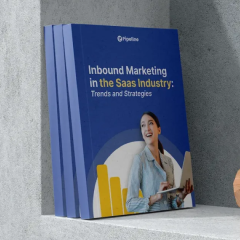
B2B marketing automation strategies refer to the use of automated tools and technologies to streamline and optimize various marketing processes. These strategies aim to improve efficiency, increase lead generation, nurture prospects, and enhance overall marketing effectiveness.
B2B marketing, short for Business-to-Business marketing, refers to the process of promoting and selling products or services from one business to another. In this type of marketing, the target audience consists of businesses, corporations, or organizations.
Marketing automation in B2B is to establish strong business relationships, generate leads, and convert those leads into customers. It involves strategies and tactics tailored to specific needs and preferences.
This is a marketing strategy focused on identifying and attracting potential customers (leads) who are more likely to be interested in a specific product or service. Therefore, this Lead Generation strategy hones in on a well-defined and relevant audience.
Hence, increasing the chances of converting leads into actual customers. The first step is to determine the characteristics and attributes of the ideal customer for the product or service. Therefore, this includes factors such as demographics (age, gender, location), and the like.
Once the target audience is defined, marketers can create relevant and valuable content, offers, or incentives. Targeted lead generation involves reaching the audience through various channels, including email marketing, social media, etc.
Those are two essential components of the lead management process, aimed at optimizing the sales and marketing efforts to convert potential leads into customers. Both strategies are closely interconnected and play significant roles in a successful lead generation and conversion process.
This is the process of assigning a numerical value or score to each lead based on their interactions and behaviors with a company's marketing efforts. Usually, the score is accumulated by using a specific point value. Such as the industry, company size, and job title.
Additionally, also website visits, link clicks, engagement with social media, email opens, and time spent on certain pages. Once the score reaches a predefined threshold, they are considered "sales-ready" and can be passed on to the sales team for further engagement.
This is the process of building relationships with potential customers at various stages of the buyer's journey. Lead nurturing is typically done through automated email campaigns or personalized content.
The goal is to keep the leads engaged, educate them about the company's offerings, showcase thought leadership, and gradually move them toward making a purchase decision.
Leads with higher scores can receive more personalized and sales-focused content. While those with lower scores can be nurtured with educational and informative materials until they are ready to progress further in sales.
This is one of the marketing automation strategies that is commonly used. Refer to the process of using email marketing software or tools to automatically send targeted and personalized emails to specific segments of your audience based on predefined triggers or actions.
These campaigns are designed to engage, nurture, and convert leads or customers in a more efficient and scalable way. Usually, it is initiated by specific triggers or actions taken by the recipients or prospects. Such as making a purchase or abandoning the cart.
Email lists are segmented based on various criteria, such as demographics, behavior, engagement level, past purchases, or interests. Additionally, the emails are customized with the recipient's name and company name and other relevant details.

This is one of the B2B marketing automation strategies called drip campaigns. Also known as automated drip email campaigns, are a type of email marketing strategy where a series of pre-written, automated emails are sent to prospects or customers at predetermined intervals.
Usually, this campaign is triggered by specific events or actions the recipients take. Such as making a purchase or downloading an e-book. The content of the email is strategically dripped to the recipients over time, maintaining consistent engagement to make them interested.
Behavioral Tracking and Personalization
Behavioral tracking and personalization are two powerful B2B marketing automation strategies that work hand in hand to provide a more targeted and customized experience for users and customers. Using data and technology to understand individual behaviors and preferences.
This involves monitoring and analyzing how users interact with a website, app, or digital platform. Various tools and technologies, such as cookies and tracking pixels, collect data on user actions, including page views, clicks, scrolling behavior, time spent on pages, form submissions, and more.
The data gathered from behavioral tracking helps businesses understand user interests, preferences, and intentions. Therefore, it provides valuable insights into what content or products users are most interested in and at which point they drop off from the sales network.
This involves tailoring marketing efforts to meet the individual needs, preferences, and behaviors of each user or customer. Moreover, personalized experiences make customers feel valued and understood, leading to increased satisfaction and loyalty.
Automated CRM integration refers to the process of automatically connecting and synchronizing data between different software systems. Therefore, the particular focus is on integrating customer relationship management (CRM) platforms with other applications and databases.
The goal of automated CRM integration is to streamline data management, improve efficiency, and provide a unified view of customer information across various business processes. Moreover, it ensures that data flows seamlessly between the CRM system and other software applications.
This synchronization can include various types of data. Such as customer contact information, purchase history, lead details, interactions, support tickets, and more. Depending on the setup, CRM integration can be real-time or scheduled.
By automating data synchronization, automated CRM integration reduces the need for manual data entry and minimizes the risk of human errors. This leads to increased productivity and more accurate customer data.
This B2B marketing automation strategy involves delivering personalized and relevant content to users. This is based on their individual preferences, behavior, demographics, or other data points.
This approach aims to create a more engaging and tailored user experience. Additionally, it is increasing the likelihood of user engagement, conversion, and customer satisfaction. Dynamic content is flexible and changes based on specific criteria or triggers.
Therefore, businesses first collect and analyze data about their users. Based on this data, users are segmented into different groups or personas. Once users are segmented, dynamic content is created or curated to match the interests and needs of each segment.
These are two essential components of a successful sales and marketing automation process. They work together to help businesses prioritize leads, enhance communication between sales and marketing teams, and improve the efficiency of the sales process.
This is a method used to rank or score leads based on their level of engagement, interests, and potential to become a customer. The purpose is to identify and prioritize leads that are most likely to convert into customers.
Sales alerts are notifications sent to the sales team in real time when a lead achieves a specific threshold in the lead scoring process or when a lead takes a critical action indicating high buying intent.
These alerts are automatically triggered by the marketing automation system based on predefined rules and thresholds. Sales alerts can be delivered through various communication channels, such as email, instant messaging, or integrated directly into the CRM system.
In conclusion, when implementing B2B marketing automation strategies, it's essential to maintain a balance between automation and human touch. Personalization and genuine engagement are still vital, so it's crucial to have the right balance to ensure a positive customer experience.
Don't miss out on this opportunity to revolutionize your campaigns and drive sustainable business expansion. Let's start the conversation today - your success story begins here!


